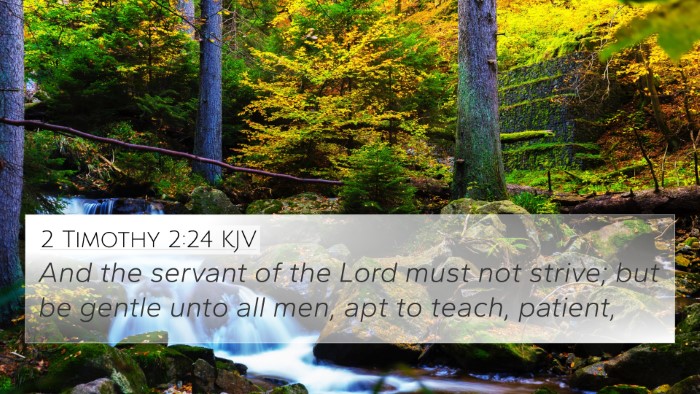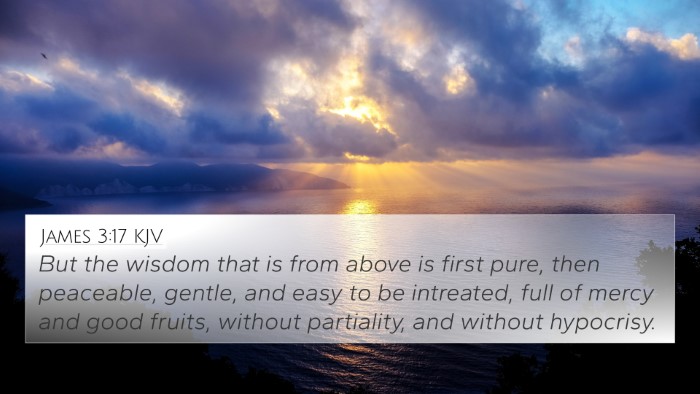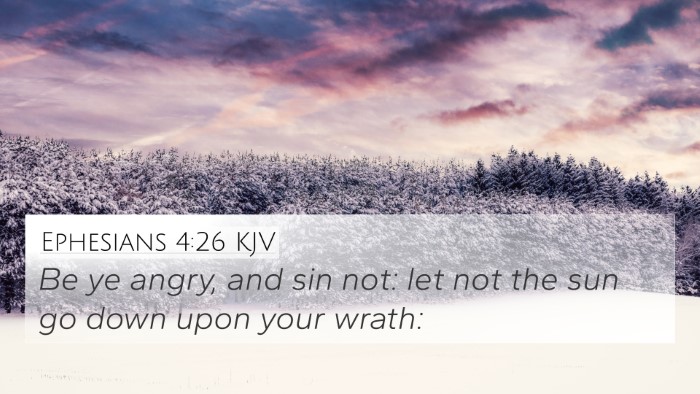Old Testament
Genesis Exodus Leviticus Numbers Deuteronomy Joshua Judges Ruth 1 Samuel 2 Samuel 1 Kings 2 Kings 1 Chronicles 2 Chronicles Ezra Nehemiah Esther Job Psalms Proverbs Ecclesiastes Song of Solomon Isaiah Jeremiah Lamentations Ezekiel Daniel Hosea Joel Amos Obadiah Jonah Micah Nahum Habakkuk Zephaniah Haggai Zechariah MalachiJames 1:20 Similar Verses
James 1:20 Cross References
For the wrath of man worketh not the righteousness of God.
Uncover the Rich Themes and Topics of This Bible Verse
Listed below are the Bible themes associated with James 1:20. We invite you to explore each theme to gain deeper insights into the Scriptures.
James 1:20 Cross Reference Verses
This section features a detailed cross-reference designed to enrich your understanding of the Scriptures. Below, you will find carefully selected verses that echo the themes and teachings related to James 1:20 KJV. Click on any image to explore detailed analyses of related Bible verses and uncover deeper theological insights.

2 Timothy 2:24 (KJV) »
And the servant of the Lord must not strive; but be gentle unto all men, apt to teach, patient,

James 3:17 (KJV) »
But the wisdom that is from above is first pure, then peaceable, gentle, and easy to be intreated, full of mercy and good fruits, without partiality, and without hypocrisy.

Numbers 20:11 (KJV) »
And Moses lifted up his hand, and with his rod he smote the rock twice: and the water came out abundantly, and the congregation drank, and their beasts also.
James 1:20 Verse Analysis and Similar Verses
Understanding James 1:20
James 1:20 states: "For the wrath of man worketh not the righteousness of God." This verse emphasizes the conflict between human anger and divine righteousness. Below is a comprehensive interpretation based on various public domain commentaries.
Commentary Insights
- Matthew Henry: Henry suggests that human anger is often sinful and counterproductive. It does not align with God's will, which seeks peace and righteousness. He asserts that anger can cloud judgment and lead to actions that are not pleasing to God.
- Albert Barnes: Barnes elaborates on the futility of anger when striving for righteousness. He points out that man's anger fails to achieve God's standards and typically results in disobedience and sin. Barnes urges believers to pursue the righteous life that is characteristic of true followers of Christ.
- Adam Clarke: Clarke discusses the implication of this verse in the context of trials and temptations. He emphasizes the necessity of humility and submission to God in faith, which contrasts with the impulsive reactions driven by anger. Clarke also points to the need for believers to cultivate patience and forbearance.
Cross-References for Further Study
This verse connects with multiple other scriptures that discuss the nature of human anger and God’s righteousness:
- Proverbs 14:29: "He that is slow to wrath is of great understanding: but he that is hasty of spirit exalteth folly." This aligns with James 1:20, underscoring the importance of patience and wisdom over anger.
- Ecclesiastes 7:9: "Be not hasty in thy spirit to be angry: for anger resteth in the bosom of fools." Again, this verse warns against the folly of quick anger.
- Ephesians 4:26-27: "Be ye angry, and sin not: let not the sun go down upon your wrath." Paul acknowledges anger but emphasizes the necessity of controlling it to avoid sin.
- Colossians 3:8: "But now ye also put off all these; anger, wrath, malice, blasphemy, filthy communication out of your mouth." This verse demonstrates a call to reject anger as part of the old life and embrace righteousness.
- Galatians 5:19-21: This passage lists the works of the flesh, including strife and anger, pointing out their incompatibility with the fruit of the Spirit.
- Romans 12:19: "Dearly beloved, avenge not yourselves, but rather give place unto wrath: for it is written, Vengeance is mine; I will repay, saith the Lord." This reinforces the principle that divine justice is better served without human wrath.
- Psalms 37:8: "Cease from anger, and forsake wrath: fret not thyself in any wise to do evil." This psalm advises against the destructive cycle of anger.
Interpretive Themes
James 1:20 offers deep insights when considered in a broader theological framework:
- Human vs. Divine Responses: The verse contrasts the flawed human emotion of anger with the divine call to righteousness. It implies that our responses to circumstances should reflect God's character rather than human tendencies.
- The Consequence of Anger: Following anger often results in sinful behavior, which disrupts our relationship with God and undermines our witness to others.
- Call to Patience: This verse pleads for believers to cultivate a spirit of patience and self-control, aligning with other biblical teachings that highlight the virtues of the Spirit over the impulsiveness of the flesh.
Bible Study Methods and Resources
For those looking to delve deeper into the connections between Bible verses, several tools can enhance your study experience:
- Bible Concordance: A helpful tool for locating specific verses and understanding their meanings within the broader context of Scripture.
- Cross-Reference Bible Study: Systematic study of related verses to uncover thematic connections and deeper insights.
- Bible Cross-Reference Guide: Resources that provide an organized methodology for linking scriptures across the Bible.
- Bible Chain References: A technique of connecting verses thematically, allowing for an integrative approach to Scripture.
Closing Reflection
James 1:20 is a critical verse that helps believers navigate the complexities of anger and righteousness. By understanding its implications and connecting it with other scriptures, one gains a comprehensive view of how to live a life that reflects God's character. Engaging in cross-referencing biblical texts enriches one’s faith journey and unveils the interconnectedness of God's Word.



